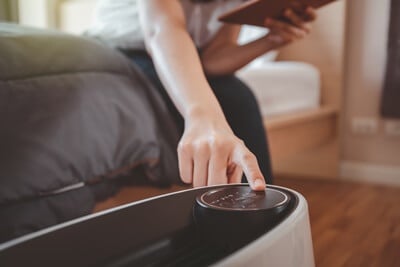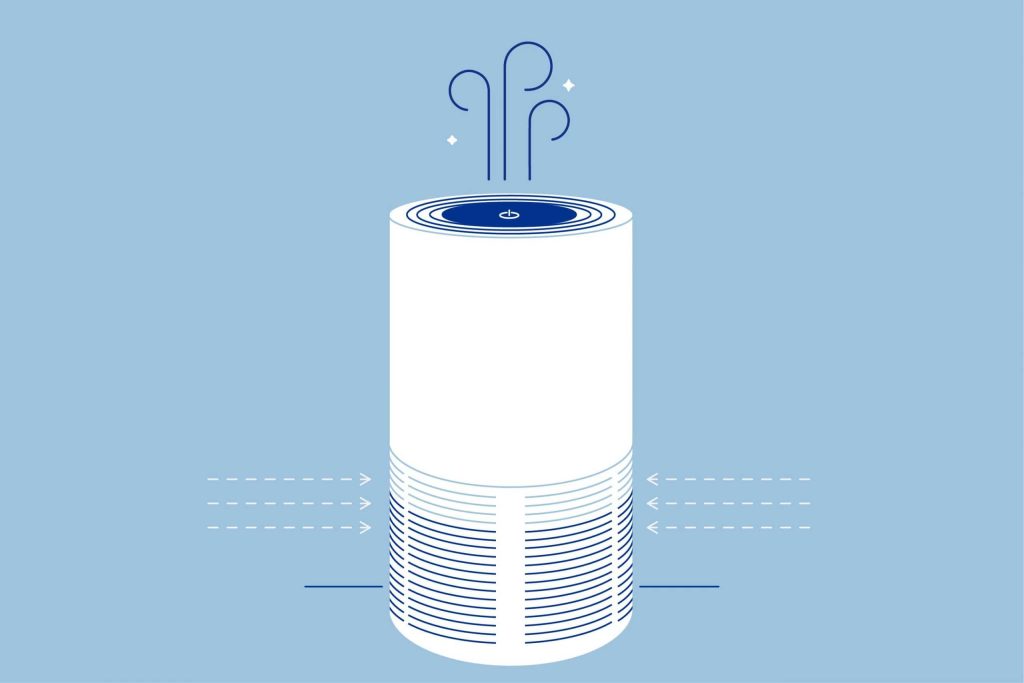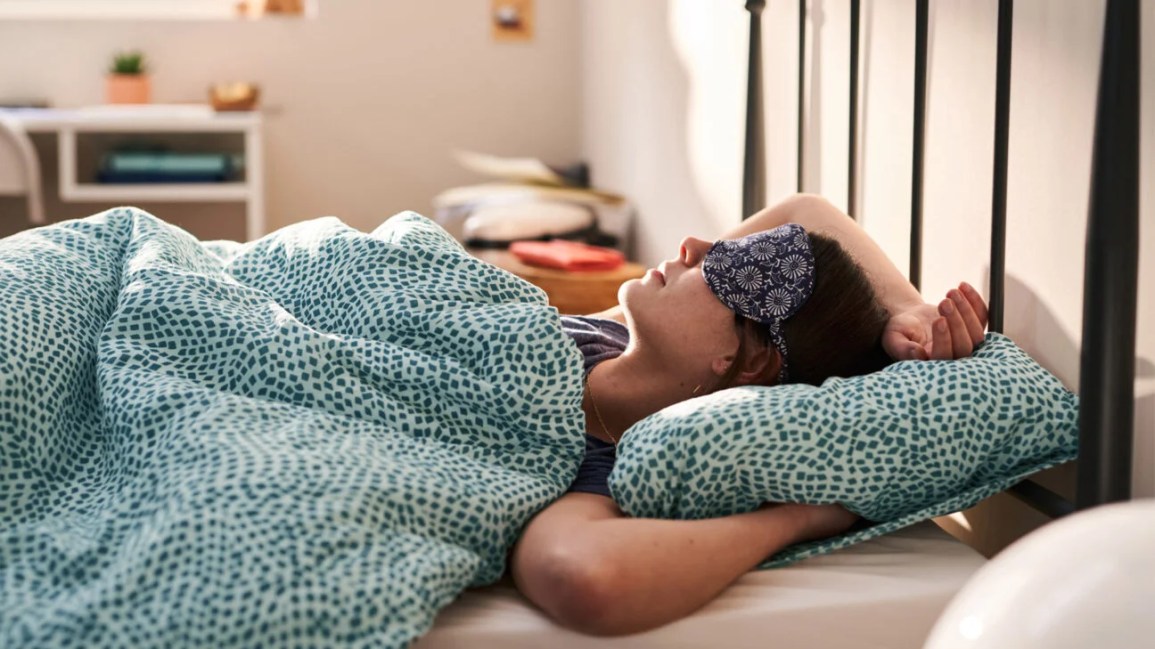You’re not the only one who has ever questioned, “Can Air Purifiers Help With Improving Sleep Quality?”. Many people are looking for methods to improve their sleeping conditions and general well-being. In this article, we’ll examine the potential advantages of air purifiers for improving the quality of your sleep and your ability to get a good night’s rest. So let’s get started if you’re ready to learn how breathing clean air can help you sleep better.
Benefits of Improved Sleep Quality
Importance of Sleep Quality
You need a decent night’s sleep for your general health and well-being. Your body may heal and restore itself when you consistently receive enough good sleep. It is essential for preserving a robust immune system, controlling your mood, and enhancing cognitive function. Poor sleep can increase the risk of heart disease, obesity, diabetes, and depression, among other health problems. As a result, putting great sleep first is essential for both your general health and day-to-day operations.
Effects of Poor Sleep Quality
On the other side, getting poor-quality sleep might hurt your physical and mental health. When you don’t get enough good sleep, you could have trouble focusing, have memory issues, and be less productive during the day. Additionally, it may weaken your immune system, making you more prone to sickness. Additionally, a lack of quality sleep is linked to a higher chance of contracting long-term diseases like cardiovascular disease, obesity, and mental health issues. It may have a negative effect on your mood, making you more irritable, prone to mood swings, and more likely to experience anxiety and sadness.
Factors Affecting Sleep Quality
Environmental Factors
The setting in which you sleep has a big impact on how well you sleep. Your ability to fall asleep and stay asleep throughout the night can be significantly influenced by variables including noise, temperature, illumination, and air quality. Particularly poor air quality can be a factor in respiratory conditions, congestion, and allergies, all of which can interfere with your ability to sleep. To ensure restful sleep, environmental elements that affect the quality of the sleep must be addressed.
Health Factors
Your quality of sleep may be impacted by a number of medical issues. A few disorders that can prevent you from getting a deep and rejuvenating sleep are sleep apnea, insomnia, restless leg syndrome, and chronic pain. To guarantee that you can benefit from genuinely restorative sleep, it’s critical to manage any underlying medical disorders that might be affecting the quality of your sleep.
Psychological Factors
Sleep quality can be strongly impacted by psychological issues such stress, anxiety, and sadness. Your thoughts may be racing when you’re upset or apprehensive, making it difficult to fall asleep or stay asleep all night. Sleep patterns can be disrupted and insomnia developed as a result of mental health concerns. It is crucial to address psychological issues if you want to increase your general wellbeing and sleep quality.

Understanding Air Purifiers
What Are Air Purifiers?
By eliminating contaminants and pollutants from the air, air purifiers are tools used to enhance indoor air quality. By filtering the air and removing contaminants like dust, pollen, pet hair, mold spores, even certain bacteria and viruses, they function. Air purifiers can improve the quality of your sleep by purifying the air you breathe and fostering a cleaner, healthier environment.
How Do Air Purifiers Work?
Different technologies are used by air purifiers to clean the air. The most popular technique involves using filters, which can catch particles as they move through the apparatus. While some air purifiers also produce negative ions to remove airborne contaminants, others use UV-C radiation to destroy germs and viruses. Depending on the type of air purifier, the precise mechanism of action may differ.
Types of Air Purifiers
The market offers a variety of air purifier kinds, each with special features and filtration techniques. The most typical varieties include:
- HEPA Filter Air Purifiers: These purifiers use High-Efficiency Particulate Air (HEPA) filters, which are capable of capturing particles as small as 0.3 microns with an efficiency of 99.97%. HEPA filters are highly effective in removing allergens and airborne pollutants, making them a popular choice for those with allergies or respiratory issues.
- Activated Carbon Air Purifiers: These purifiers contain activated carbon filters, which are effective in absorbing and eliminating odors, chemicals, and volatile organic compounds (VOCs) from the air. They are particularly beneficial for improving indoor air quality by removing unpleasant smells and reducing exposure to potentially harmful substances.
- UV-C Air Purifiers: These purifiers use ultraviolet light to kill bacteria, viruses, and other microorganisms by disrupting their DNA. UV-C purifiers can be effective in reducing the presence of germs in the air, helping to create a healthier sleep environment.
- Ionic Air Purifiers: These purifiers release negative ions into the air, which attach to positively charged particles and cause them to clump together. These larger particles then become heavier and fall out of the air, reducing their presence. Ionic air purifiers are known for improving overall air quality, but their effectiveness in removing allergens and pollutants may vary.
Air Purifiers and Sleep Quality
Reducing Allergens and Irritants
Reducing allergens and irritants in the air is one of the main advantages of using an air purifier. Allergens can cause allergic reactions and discomfort while you sleep, such as pollen, cat dander, and dust mites. Air purifiers produce a cleaner environment by removing these particles before they can cause irritation or allergies, which might interfere with your sleep.
Removing Airborne Particles
Dust, smoke, and mold spores are just a few of the different airborne contaminants that air filters are efficient at removing. For people who have respiratory conditions or allergies, these particles can be especially unpleasant. Air purifiers can lower the chance of respiratory irritation and enhance overall air quality by removing harmful particles from the air, which helps to promote a more tranquil and restful night’s sleep.
Eliminating Odors
Unpleasant smells can be a major distraction and have an impact on your sleep. Filters made of activated carbon found in air purifiers can successfully get rid of smells from cooking, pets, and other causes. Air purifiers make the surroundings more pleasant and fresh as you sleep, promoting deeper, more restful sleep.
Regulating Humidity Levels
A sleep environment that is too humid can encourage the development of mold and bacteria. Some cutting-edge air purifiers have dehumidifiers or humidifiers built right in to control the humidity levels in the air. Air purifiers can contribute to the creation of a cozy sleeping environment for a better night’s sleep by maintaining ideal humidity levels.

Choosing the Right Air Purifier for Sleep Improvement
Considerations for Bedrooms
There are a number of things to take into account when choosing an air purifier for your bedroom. First and foremost, the room’s size is important because it defines the right purifier size and coverage area. Additionally, noise levels should be considered because a noisy air purifier can interfere with your ability to sleep. Another crucial factor to take into account is energy efficiency, as you want to make sure the purifier is both economical and environmentally responsible.
Types of Filters
Filtration efficiency varies among different types of filters. HEPA filters are highly advised for people with allergies or respiratory disorders because they trap a variety of airborne particles. Chemicals and odors can be effectively eliminated using activated carbon filters. Selecting a purifier with several filters can offer thorough air filtration and meet various needs.
Noise Levels
An air purifier’s noise can impair your ability to sleep. Be on the lookout for silent air purifiers, particularly those featuring a sleep mode or a quiet operation option. These purifiers make sure there isn’t much noise while you sleep so you can sleep peacefully.
Energy Efficiency
Because the air purifier will be working for a long time, especially overnight, take into account its energy efficiency. In order to get the most performance from your purifier, look for ones that have earned the Energy Star accreditation. Energy-efficient models can lower energy expenses while reducing their negative effects on the environment.
Size and Coverage
The air purifier’s size ought to be suitable for your bedroom. Take into account the CADR (Clean Air Delivery Rate), which shows how effectively the purifier removes particular contaminants. In order to successfully cleanse the air in your bedroom, make sure the purifier has appropriate coverage. You can have better sleep with a purifier with a higher CADR and a proper coverage area.
Best Practices for Using Air Purifiers in the Bedroom
Optimal Placement of the Air Purifier
Proper placement is crucial if you want your air purifier to work as efficiently as possible. Put the air purifier in the center of your bedroom, away from walls and other obstacles. This guarantees ideal air flow and gives the purifier the best opportunity to filter the air properly. The purifier could pull in outdoor toxins, so keep it away from open windows and doors.
Maintenance and Filter Replacement
Your air purifier must need routine maintenance and filter change in order to be effective. Follow the manufacturer’s guidelines for filter change and cleaning. Neglecting maintenance might lower the purifier’s effectiveness and jeopardize its potential to enhance air quality, which can ultimately affect how well you sleep.
Air Purifier Settings for Night Use
The majority of air purifiers have adjustable settings and fan speeds. It is advised to lower the fan speed or, if a sleep mode is available, turn the purifier on at night. Reduced fan speed results in less noise, which encourages a quieter sleeping environment. Additionally, think about using the timer option to set the purifier to turn off automatically after a set amount of time. This will ensure that it operates for the required amount of time rather than running all night.
Other Strategies for Improving Sleep Quality
Maintaining a Regular Sleep Schedule
Setting up a regular sleep routine can improve the quality of your sleep while regulating your body’s internal clock. Try to maintain a consistent bedtime and wakeup time every day, including on the weekends. Your sleep pattern should be consistent if you want to improve the quality and effectiveness of your rest.
Creating a Comfortable Sleep Environment
Your sleep environment has a big impact on how well you sleep. To encourage the best possible sleeping conditions, keep your bedroom cool, silent, and dark. To block out any outside noises that can keep you awake, use blackout drapes, earphones, or white noise devices. To provide the most comfort and support, additionally spend money on a comfy mattress, pillows, and bedding.
Managing Stress and Anxiety
Your capacity to fall asleep and stay asleep can be substantially impacted by stress and anxiety. Use stress-reduction strategies to unwind your body and mind before night, such as regular exercise, meditation, and deep breathing exercises. Establishing a nightly ritual that encourages relaxation and lets your body know it’s time to sleep is also important.
Implementing a Bedtime Routine
Your body can receive a signal from a regular nighttime ritual that it is time to relax and get ready for sleep. Before going to bed, relax by reading a book, having a warm bath, or doing some light stretching or yoga. When it’s almost time for bed, stay away from stimulating activities like strenuous exercise or excessive screen time because they can make it difficult to fall asleep.
Avoiding Stimulants
Your sleep patterns and the quality of your sleep may be affected by caffeine, nicotine, and alcohol. Avoid ingesting these things right before bed since they can make it difficult for you to fall asleep and stay asleep all night. For a more restful sleep, choose herbal tea or other caffeine-free options.
Scientific Evidence and Studies
Research on Air Purifiers and Sleep Quality
Numerous research have looked into the connection between air purifiers and restful sleep. Researchers discovered that utilizing air purifiers considerably increased the quality of sleep and decreased the number of nighttime awakenings in a study that was published in the International Journal of Environmental Research and Public Health. Another study that looked at the impact of air purifiers on asthmatic kids found that they led to better sleep quality and less asthma symptoms. It was published in the Journal of Asthma.
Effects of Air Quality on Sleep
Poor air quality has been found in studies to be hazardous to sleep. In-home air pollutants such volatile organic compounds (VOCs) and small particulate matter have been linked to higher sleep disruptions and poorer sleep quality, according to a study published in Sleep Medicine Reviews. Another study indicated that more outdoor air pollution was linked to more sleep interruptions, which was also published in the American Journal of Respiratory and Critical Care Medicine.
Impact of Allergens on Sleep Disruptions
Due to the discomfort they produce, allergies can significantly affect how well a person sleeps. According to a study in the Journal of Allergy and Clinical Immunology, exposure to allergens such dust mite dander and pet dander was linked to more frequent sleep disruptions and poorer sleep quality. Another study in the journal Allergy found that people with allergic rhinitis who avoided allergens, including by using air purifiers, had better sleep.

Potential Limitations and Considerations
Individual Sensitivities and Conditions
While many people find air purifiers to be helpful in enhancing their quality of sleep, it’s crucial to take into account each person’s sensitivities and medical issues. Certain allergies or pollutants may be more irritating to certain people than others, and this may have an impact on how well they sleep. In order to decide on the best course of action, people with allergies or pre-existing respiratory issues should speak with their healthcare professional.
Importance of Proper Ventilation
Purifiers should not take the place of adequate ventilation in your home. By often opening windows and allowing fresh air to circulate, it is imperative to maintain a well-ventilated environment. Proper ventilation along with air filtration can greatly enhance indoor air quality and aid in better sleep.
Other Sleep Disruptors
Although air purifiers can help with sleep quality, it’s also vital to address other possible sleep disruptors. Poor sleep hygiene practices, an uncomfortable mattress or pillow, excessive noise from sources other than air purifiers, and other factors can all affect how well you sleep. Taking care of these issues along with using an air purifier can result in a more notable increase in sleep quality.
Conclusion (Can Air Purifiers Help With Improving Sleep Quality)
In conclusion, buying an air purifier for your bedroom might offer a lot of advantages for raising the quality of your sleep. Air purifiers can lessen allergens and irritations, take out airborne particles, get rid of odors, and control humidity levels, all of which help to make a room more hygienic and healthy for sleeping in. To make the best decision for your needs, take into account elements like room size, filter kinds, noise levels, and energy economy when choosing an air purifier. You can improve your sleep quality in addition to utilizing an air purifier by putting into practice additional sleep-quality-improving techniques including keeping a regular sleep schedule, creating a relaxing sleeping environment, controlling stress and anxiety, and avoiding stimulants. Although air purifiers are useful, the best way to improve sleep is to recognize personal sensitivities and health issues, maintain sufficient ventilation, and address additional potential sleep disruptors. You may improve your sleep quality and enjoy all the advantages of a pleasant night’s sleep by combining these techniques.

